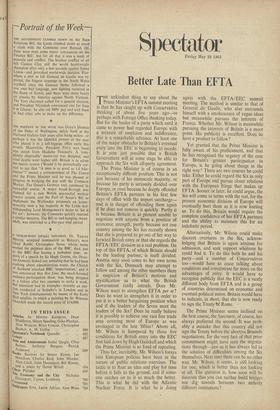— Portrait of the Week- IHE GOVERNMENT CLIMBED DOWN on the
Race Relations Bill, the Lords climbed down to avoid a clash with the Commons over Burmah Oil, there were even some minor concessions on the Finance Bill: but for all that it was a week of quarrels and conflict. The briefest conflict of all left Cassius Clay still the world heaVyweight champion after only a few seconds against Sonny Liston—and provoked world-wide derision. Else- where a plot to kill General de Gaulle was re- ported, the biggest stoppage in the South Wales coalfield since the General Strike followed a row over bad language, new fighting occurred in the Rann of Kutch, and there were more heavy air attacks by America against North Vietnam. l'he Tory chairman called for a general election. and President Nkrumah announced one for June 8 in Ghana: he also cut MPs' pay and told them to find other jobs to make up the difference.
ittE PORTRAIT OF THE WEEK was Goya's likeness of the Duke of Wellington, Safely back at the National Gallery four years after being stolen: or Perhaps it was the Identikit picture of the man who placed it in a left-luggage office early this month. Meanwhile, President Tito's wax head was stolen from Madame Tussaud's. A 'com- pletely disposable' motor-car was designed, and road deaths went higher still. Britain is to adopt the metric system ('Would it be proverbially cor- rect to say that "A miss is as good as 1.6 kilo- metres"?' mused a correspondent of The Times) and the Prime Minister said he was pleased at Progress in bridging the gap with the Common Market. The Queen's German tour continued its successful course. A major break-through was claimed for a new British gas-cooled nuclear reactor system, and the Earl of Arran's Bill to implement the Wolfenden proposals on homo- sexuality won a big majority in the Lords not- withstanding Lord Montgomery's desire to 'hit it for six': however, the Commons quickly rejected a similar measure. The Bill to end hanging, mean- While, was restricted to a five-year trial period.
*
DUBLIN-BORN ISRAELI DIPLOMAT, Dr. Yaacov Herzog, accepted nomination as Britain's next Chief Rabbi. Christopher Stone, whose - name evoked the palmiest days of the BBC, died, just as the BBC was having a turbulent time: re- Ports of a speech by Sir Hugh Greene, the Direc- tor-General, leaked out, revealing that he had been scathing about administrative waste, the Church of Scotland attacked BBC 'impuritanism,' and it was announced that Hot Line, the much-boosted audience-participation show, was being dropped " a failure after two attempts to make it work. But television had its triumphs—notably an auc- tion conducted at Sotheby's in London and in New York simultaneously by means of the Early Bird satellite, in which a painting by Sir Winston Churchill made the record price of £14,000.


































 Previous page
Previous page